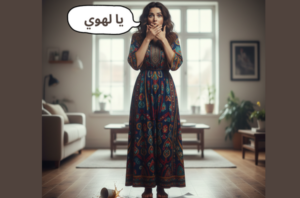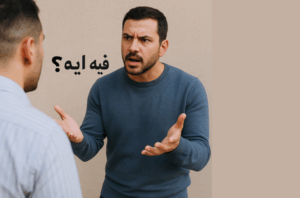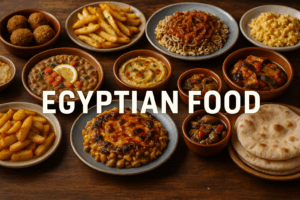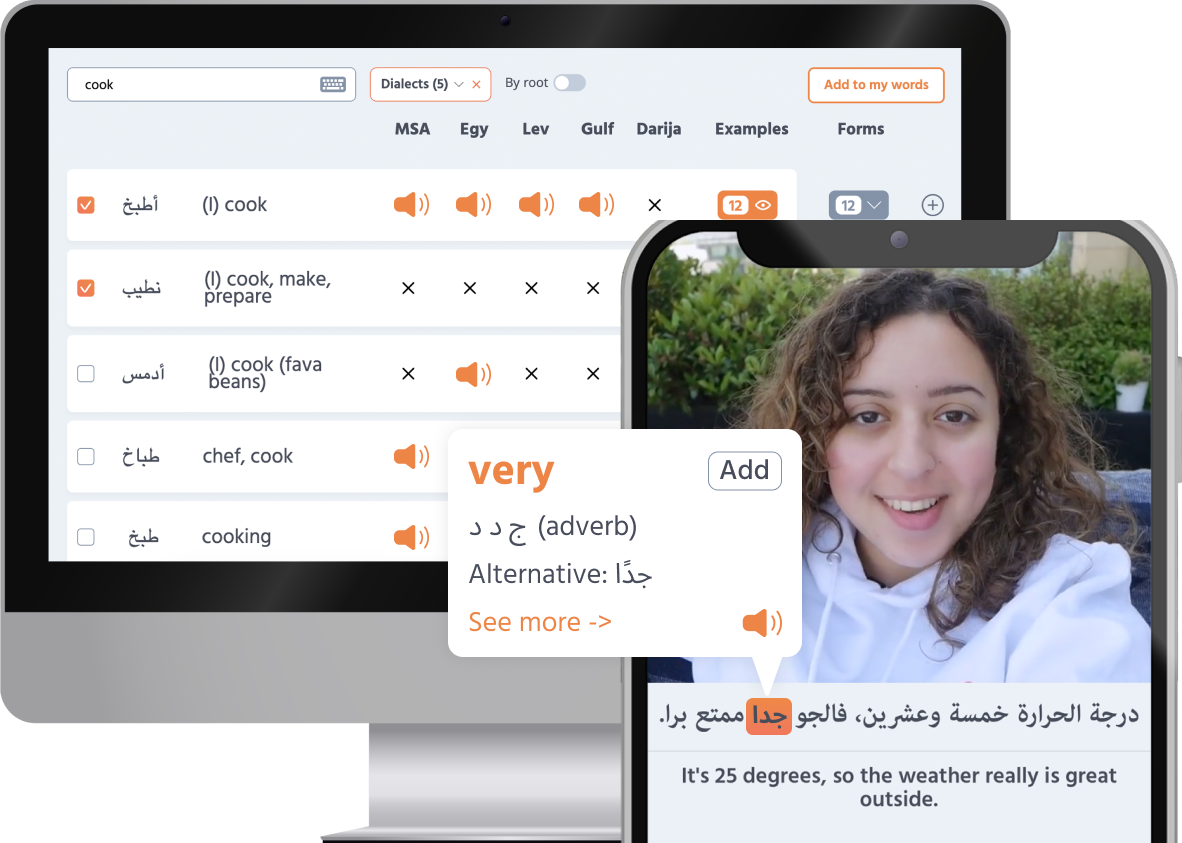Greeting someone is one of the most fundamental ways to start a conversation, show respect, and connect with others. Hello in Egyptian is more than just a word; it reflects the country’s rich traditions and culture and highlights the Egyptian people’s hospitality . In this article, we’ll explore the different ways to say hello in Egyptian Arabic , delve into the origins of these greetings, and explain how they are used in daily life.
How do you say hello in Egyptian? If you think there’s only one word for “hello” in Egyptian Arabic, you’re mistaken. You can get creative with how you greet others in the Egyptian dialect, choosing what fits the situation best. Here are the most common phrases to say hello in Egyptian Arabic.
Don’t miss our article “Conversational Essentials: Everyday Phrases in Arabic “ to learn the basic phrases and greetings in all Arabic dialects .
1. The classic greeting: سَلَامُ عَلِيكُو The phrase سَلَامُ عَلِيكُو
literally translates to “Peace be upon you.” This is the most common way to greet someone in Egypt and across the Arab world. It has a deep cultural and religious significance, rooted in Islamic tradition. The phrase is often used among Muslims , but it’s also widely accepted and understood by people of other faiths in Egypt.
Origin : The greeting comes from the traditional greeting in Islam: السَّلَامُ عَلَيْكُمْ وَرَحْمَةُ الله وَبَركَاتُه
which literally translates to: “May the peace of God, His mercy and His blessings be upon you”. The Arabic word سَلَام
means “peace.” The phrase is a standard Arabic greeting that can be traced back to Islamic texts.Cultural context : When you say سَلَامُ عَلِيكُو
, it’s customary for the other person to respond with وِعَلِيكُمْ السَّلَامْ
, meaning “And peace be upon you too.” or وعليكم السلام ورحمة الله وبركاته
meaning “peace of God, His mercy and His blessings be upon you”. This exchange embodies the spirit of community and mutual respect.
A clip from an Egyptian movie , as seen on Playaling .2. The casual hello in Egyptian: أَهْلًا and أَهْلًا وَسَهْلًا For a more casual and friendly greeting, Egyptians often use أَهْلًا
or أَهْلًا وَسَهْلًا
, especially when people pay visits to their homes. These phrases are equivalent to saying “hi” or “welcome” in English.
Origin : The word أَهْلًا
comes from the root أَ ه ل
, meaning “family” or “people.” The extended phrase أَهْلًا وَسَهْلًا
comes from the old Arabic greeting: نَزَلْت أهْلًا وحَلَلْتَ سَهْلًا
which can be interpreted as “You have arrived among family and in a comfortable place.”Cultural context : أَهْلًا
is often used when greeting friends, family, or acquaintances in a relaxed setting. أَهْلًا وَسَهْلًا
is slightly more formal and is commonly used when welcoming someone into your home or a new environment. This phrase is used in all Arabic dialects , including Levantine , Gulf , and Darija .
Two people greet each other in Arabic. 3. The warm welcome: يَا مَرْحَبْ Similar to أَهْلًا
, the expression يَا مَرْحَبْ
is another common greeting for home visits in Egypt, which means “welcome” or “hello.” It’s more formal than أهْلًا but still carries a warm and welcoming tone.
Origin : There are 2 theories about the origin of the word مَرْحَبْ
or مَرْحَبًا
The first theory says : it comes from the Arabic root رَ حَ بَ
, meaning “to be spacious” or “to welcome.”The second theory says that the word مرحبا
existed in the East before Islam and was used by Aramaic and Syriac-speaking Christians. It is divided into two parts: مور
and حوبو
The word مور
means “Lord” or “God,” and حوبو
means “love.” Together, they form the phrase “God is love.”
The shift from مورحوبو
to مرحبا
can be attributed to the natural linguistic evolution, where words are often simplified over time and adapted to fit the phonetic patterns and cultural context of the Arabic language.
Cultural context : يَا مَرْحَبْ
is often used in more formal settings, such as greeting someone who visits you at your home.
4. The Egyptian “how are you?”: إِزَّيَّكْ؟ In casual settings, Egyptians might skip the intro greeting and start with إِزَّيَّكْ؟
for a single male or إِزَّيِّكْ؟
for a single female. These phrases literally mean “How are you?” but are often used as a way of saying hello. Other expressions can be used in similar contexts, like عَامِلْ إيه؟
for a single male or عَامْلَة إيه؟
for a single female which means “How do you do?” and إ يه الأَخْبَارْ؟
which means: “Any news?”.
Origin : إزَّيَّكْ
is a coined phrase, like many in Egyptian dialect. It likely stems from the expression أي شيء زي
where زي
refers to appearance or condition. The original meaning was “What is your appearance?” This evolved into إيش زي
with إيش
being a classical Arabic term. Over time, إيش
was shortened to إي
for simplicity, and then the ي
was dropped, leaving أ
followed by زي
eventually forming إزي
.Cultural context : This greeting is very common among friends and peers. It’s an informal way to start a conversation and often leads to small talk about one’s day or well-being.
An Egyptian gives a typical response to a formulaic question about how she is.5. Time-specific hellos: صَبَاحِ الْخِيرْ and مَسَاءِ الْخِيرْ For morning and evening greetings, Egyptians often say صَبَاحِ الْخِيرْ
for ‘Good morning’ and مَسَاءِ الْخِيرْ
for ‘Good evening.’ These phrases, commonly used in Egyptian Arabic, can replace ‘hello’ but are more time-specific. So, if you’re wondering how do you say hello in Egyptian Arabic , these are time-appropriate alternatives.
Origin : صَبَاحْ
means “morning,” and مَسَاءْ
means “evening,” while الخير
means “good” or “blessed.”Cultural context : These greetings are used to acknowledge the time of day and show politeness. They are common in both formal and informal settings. Pro tip: If you have a crush on someone, you can elevate a simple greeting to a more romantic one by saying phrases like صباح الورد
(roses morning), صباح العسل
(honey morning), صباح الفل
(Arabian jasmine morning), or صباح الياسمين
(jasmine morning). You can also replace صباح
with مساء
to use these phrases in the evening. And don’t forget, it works for family and friends too—they deserve some honey and flowers as well, don’t they? The standard replies to صباح الخير
(Good morning) and مساء الخير
(Good evening) are صباح النور
(Morning of light) and مساء النور
(Evening of light).
Employees greet their manager with morning greetings , some of which seem intended to kiss up to him.6. The unique phrases to say hello in Egyptian مِسا مِسا
(literally: afternoon afternoon)
أحَلَى مِسا عَليك
(literally: the nicest afternoon for you)
In Egypt, different regions may have different ways of greeting each other. Don’t worry if you don’t recognize these regional examples, they’re slang specific to their region.
In Damietta for example, you might hear:
إشطا يا أحمَد
(Yo yo wassup Ahmed)
In Sharqia (even if it doesn’t make literal sense), people might just ask each otherايه ياسطا
(Wassup bro) / ايه يا محمد
(Wassup Mohammed)
It literally means “what, bro?”, but it’s totally understood as a quick greeting.
7. The modern twist: هَايْ With the influence of Western culture, especially among younger Egyptians, you might also hear هاي
as a casual greeting in Egyptian Arabic. This English word has been adopted into the local dialect and is commonly used in informal settings.
Cultural context : هَايْ
is often used among the younger population and in urban areas, reflecting the blending of cultures in modern Egyptian society.
8. The phone greeting: ألُو When answering the phone in Egypt, you’ll often hear ألُو
. This greeting is similar to saying “hello” when picking up a call in English-speaking countries.
Origin : The term ألُو
is derived from the French word “Allô,” which was adopted into Egyptian Arabic during the time of European influence in the region.Cultural context : ألُو
is used exclusively for phone conversations. It’s a simple and effective way to start a phone call, and it reflects the influence of Western culture on Egyptian communication practices.
Playaling teaches you everyday phrases through real world videos , including TV series and movies, like the one above. Understanding how to say hello in Egyptian Arabic goes beyond memorizing phrases ; it involves appreciating the Egyptian cultural references behind each greeting. Whether you choose سلام عليكو
for a formal hello or أهلًا
for a more casual one, you’re participating in a tradition that’s rich with meaning and history. So next time you’re in Egypt or practicing Egyptian Arabic with a local, try one of these greetings and see how it opens doors to warm conversations and connections.
Oh, and by the way… If learning Egyptian Arabic at your own pace, with fun, real-world videos sounds like your style, then Playaling could be exactly what you’re looking for!
With Playaling, you’ll dive into Arabic just as it’s spoken in Egypt. Our diverse range of videos has it all—from everyday conversations and cultural moments to music videos, TV and movie clips, influencer content, news broadcasts, and inspiring talks.
Our interactive captions let you tap any word for instant translations, context, and audio. So, real Egyptian content becomes accessible with just a click. Miss something? No problem—rewind and listen as often as you need, or hover over subtitles for quick definitions.
Spot a word you want to learn? Save it to your personalized word set, or dive into curated sets for focused practice and easy review.
Interactive exercises let you dive in and practice what you’ve learned.
Need to look something up? The Audio Dictionary has you covered with clear human pronunciations and real world examples.
It’s a learning experience that keeps you engaged, bringing authentic, real-world Arabic closer to you every step of the way.
Give it a try!









